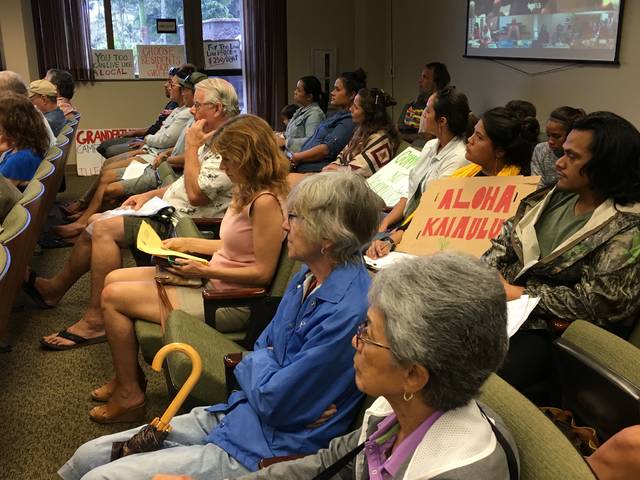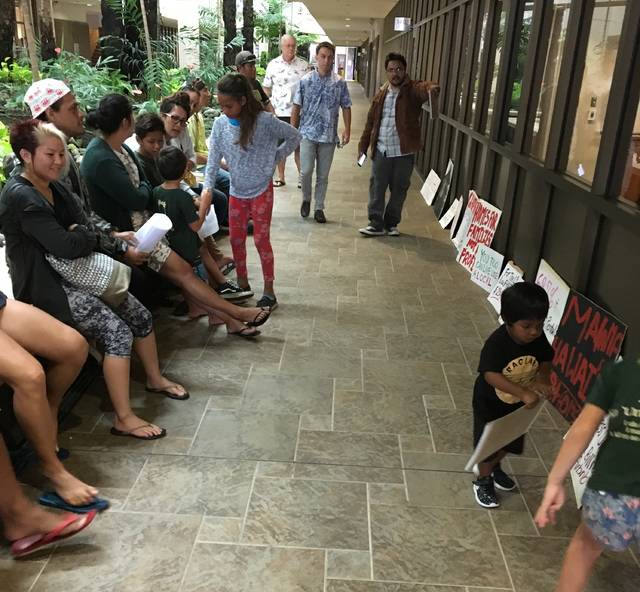HILO — No matter where they stand on the issue, one thing was clear Tuesday. People care very deeply about vacation rentals.
Residents packed council chambers in Hilo and Kona, and almost 100 signed up to talk about Bill 108, the County Council’s first attempt to regulate the increasingly popular Airbnb, VRBO and other short-term rentals. The county is the only one in the state not regulating such rentals.
Testifiers over five hours were fairly evenly divided between those supporting and opposing the bill.
The council Planning Committee took its first stab at the bill during an additional two hours of discussion before recessing until May 8.
It’s an emotional issue. On the one hand, there are people who moved to residential neighborhoods, some at personal financial sacrifice, for the peace and quiet of a residential neighborhood, only to see it taken over by rentals.
Testifiers described lost strangers knocking on their doors late at night looking for their rental, loud, “alcohol-infused” conversations past midnight, children splashing and shouting in swimming pools at 6 a.m. and more than a dozen vacationers packed into a single-family home.
“Homes for families, not for profits,” “You, too, can live like a local” and “Choose residents, not greed” were among hand-made signs hoisted by Hilo testifiers.
On the other hand, there are people who, some also at personal financial sacrifice, bought a home in Hawaii and plan to rent it out until they retire or can afford to move here. Vacation rentals are a way to pay mortgages and taxes on their investment, they say.
“This bill seems to imply that tourists are a plague that need to be confined to the resort areas,” said Rick Shonhauer, who is currently purchasing property in Kona for a vacation rental in anticipation of retiring there someday.
Bill 108 is an attempt to prevent unhosted short-term rentals in residential and agricultural zones. Existing rentals in good standing in those areas would be able to apply for a nonconforming use certificate that must be renewed annually for a $500 fee.
The county estimates there are 8,000 vacation rentals currently operating.
Mayor Harry Kim, who asked the council to pass a measure regulating the rentals, urged the council to continue its effort.
“People demanded that government needs to do something about what is happening to Hawaii,” Kim said. “One thing in common they’re saying is we have to regulate this business. And that’s what we’re trying to do.”
Some testifiers pointed out that regions such as Puna and Volcano have no resort or hotel zones and very little commercial zones where vacation rentals would be allowed. Any new law should be able to accommodate those areas, they said.
Others said they don’t think nonconforming uses should be grandfathered in at all.
“Why should we reward them for getting in before we realized they were an invasive species?” said Sarah Moon, who lives in Leleiwi, an oceanfront community near Hilo.
Short-term vacation rental is defined in the bill as a residential dwelling where the owner or operator does not reside on the building site, that has no more than five bedrooms on the building site for transient use, and is rented to transients for a period of 30 consecutive days or less.
Proponents of allowing short-term vacation rentals say the practice brings tax dollars and investment money into the county and employs construction and maintenance companies, while attracting visitors who don’t like staying in hotels. Too much regulation will hurt the economy, they say.
“Most vacation rental home owners we know personally, who do not live on our island, are couples with dreams to retire here and in the meantime rent out their homes to help with the mortgage payments,” said Magdalene Phillips, who owns a vacation rental in Puna.
If there were fewer short-term rentals, perhaps there would be more housing opportunities for long-term residents, some opponents of vacation rentals say.
“There is already a shortage of affordable homes in the Kona district and vacation rentals by absentee owners only exacerbate that problem and drive up the costs of housing for residents,” said Charles Young of Honaunau.
Others say the government should just enforce the laws already in place.
“The state of Hawaii needs to address the laws they have in place before making new laws,” said Patricia Starkie, of Pahoa, who has owned vacation rentals on the Big Island since 2004.


